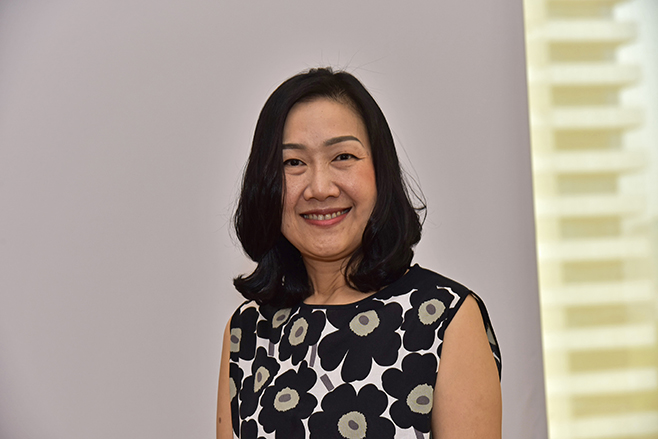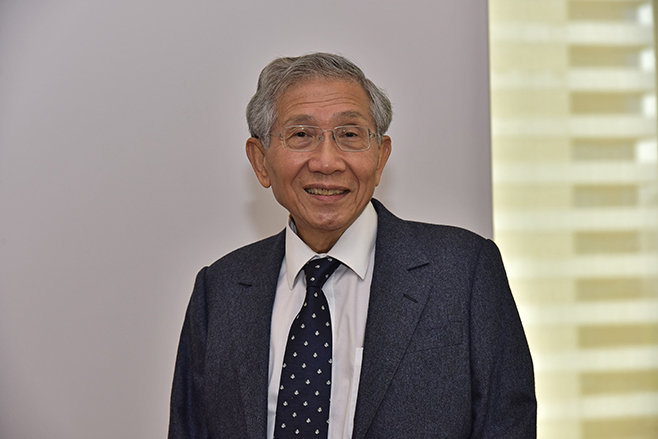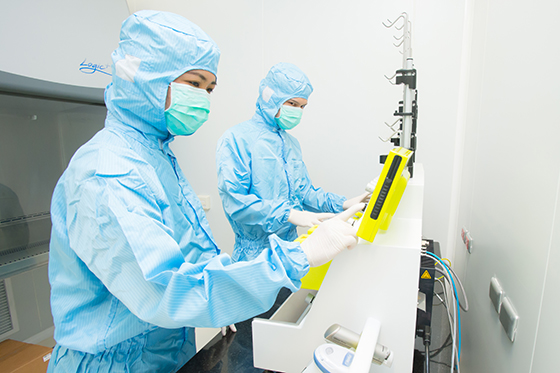After the ordeals of various breast cancer treatments that could not stop it from spreading to her liver, lungs, and bones, Ploenpit Goware decided to stop the treatments and was resigned to spend the rest of her days with her daughter. That was before Assoc. Prof. Dr. Kris Chatamra, Head of the Queen Sirikit Center for Breast Cancer, Chulalongkorn Hospital recommended “Immunotherapy” which gave her a sense of renewed hope.

Ploenpit Goware
“My condition remarkably improved after 6 months of treatment — from being bound to a wheelchair and having trouble walking because of compromised skeletal integrity, now I can walk up and down the stairs without feeling exhausted. The pain in my bones has disappeared and I no longer need to rely on painkillers. The biopsy results from my liver with metastasized cancer show no traces of cancer cells left,” Ploenpit said with a smile, adding that the side effects of the treatment were only some blisters and minor joint pains.
Today, Ploenpit is living a normal life. She only has to be mindful of the movements involving her back and neck due to compromised bones from her previous treatments some years ago.
Breast Cancer: The Number One Threat to Women Worldwide
Breast cancer is the world’s number-one cancer that costs women’s lives and it is also the most prevalent type of cancer among Thai women. There are many ways to treat breast cancer according to world standards, i.e. chemotherapy, radiation therapy, hormone therapy, targeted therapy, and surgery. However, for some patients, even after these treatments, cancer may recur. So, immunotherapy is another alternative.
“Immunotherapy is one option of cancer treatments. Studies have been done overseas over several decades, but the method has never been applied to breast cancer treatment, nor has there been any tailor-made treatment for each patient,” said Assoc. Prof. Dr. Kris.
“For a long time now, the Center has been studying this topic, preparing tools and equipment, as well as amassing the medical team, until we found the way to treat breast cancer with immunotherapy and can help patients.”

Assoc. Prof. Dr. Kris Chatamra,
Head of the Queen Sirikit Center for Breast Cancer, Chulalongkorn Hospital
How Immunotherapy Works Against Breast Cancer
Assoc. Prof. Dr. Kris explained that immunotherapy works by stimulating the most common and basic immune cells or T-cells in order to get rid of the cancer cells.
“The immune system is the most crucial system of the human body. When pathogens enter the body, the immune activates to fight them. However, when cancer cells occur, the immune system does not destroy these cells as it misreads them for normal cells. So, we have been studying the unique properties of these cancer cells, and found that their outer cell membrane contains certain specific proteins that are different in each patient.”
“We take the patient’s immune cells and grow them in the lab alongside the specific proteins (peptides) of that patient’s cancer. Within 24 hours, the immune cells will learn and remember the cancer cells’ specific peptides. Then, we will inject the learned immune cells into the patient’s lymph nodes so that they spread throughout the immune system and help destroy the cancer cells,” Assoc. Prof. Dr. Kris further elaborated on the immunotherapy procedure.

Immunotherapy and the Future of Cancer Treatment
Having successfully treated the first patient, the Center started using immunotherapy to treat other breast cancer patients and expected to cut the treatment cost down by one-third from that of the first patient’s – making it cost even less than chemotherapy.
“In over 50 years of my experience as a breast cancer doctor, times have drastically changed. With early detection, coupled with immunotherapy treatment, patients’ have up to 90 percent chance of being cured.”
“For those who are cured, nobody can tell if the cancer will come back. The only thing I can say is that the immune system will remain in the body forever, and should there be new cancer cells, it should be enough to put up a fight.”
Most importantly, Assoc. Prof. Dr. Kris said that the immune system has access to any part of the body, including the brain, whereas chemotherapy cannot. “Do not despair. I want every patient to have hope,” he added.

